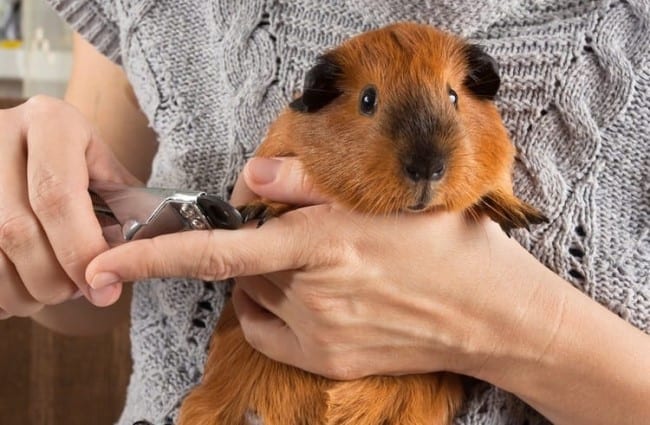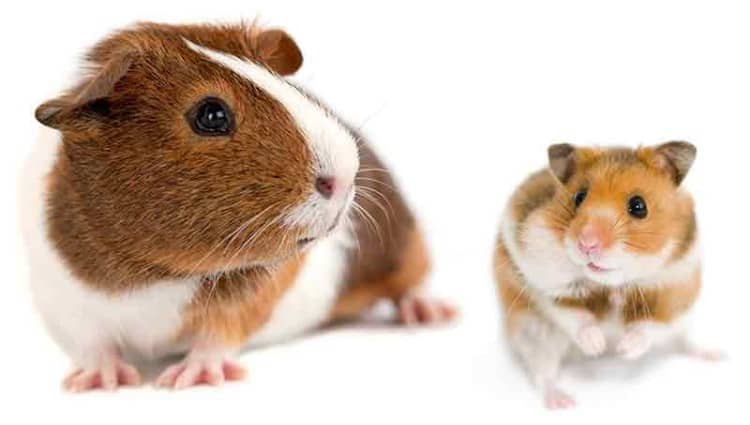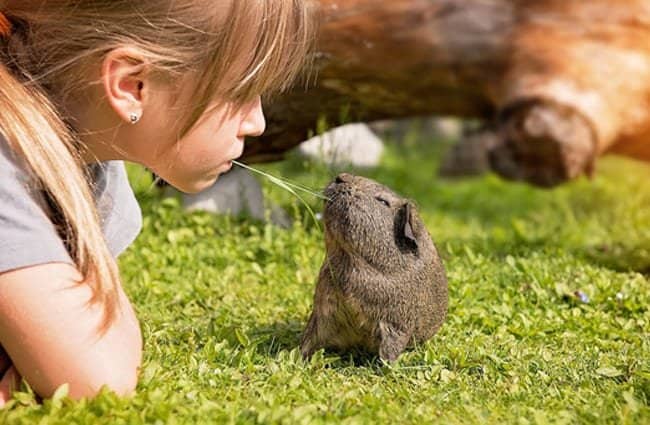Guinea Pigs
Guinea Pigs Make Great Pets For Children
Guinea Pigs might be small but you should never overlook them if you’re in the hunt for the perfect pet.
Guinea pigs as pets are especially ideal for families with young children, where space is at a premium or if the cost of owning a dog or cat is beyond your budget.
Guinea Pigs are absolutely adorable, cuddly (if trained), gentle and pretty easy to look after. Guinea Pigs are not pigs (or even related) nor are they from Guinea so the origins of the name are a mystery.
Guinea Pigs (Cavia porcellus, also known as cavy or cavie) are actually a type of rodent from the South American Andes.
European explorers first fell in love with the humble Guinea Pig in the 16th century and brought them back home with them.
Since then their popularity has spread around the world. Today, Guinea Pigs as pets are renowned for their quiet, gentle, easy-care friendly natures.
Guinea Pigs, Choosing the Right Breed
It’s really important to choose the right breed of Guinea pigs. With a lifespan of around 7 years your Guinea Pig represents a very real commitment.
Unfortunately, too many unwanted Guinea Pigs are dumped because the person fell in love with these highly adorable creatures only to later realise they couldn’t look after them properly.
Do you want a short-haired, long-haired or perhaps a hairless variety?
Here is a list of just some of the extraordinary Guinea Pig breeds that you can choose from:
- Abyssinian
- Sheba mini yak
- White Crested
- Rex
- Himalayan
- American Crested
- Texel
- Roan
- Agouti
- Short haired Guinea Pigs
Click here to see our full list of Guinea Pig breeds.
How Many Do You Want to Keep?
Remember, Guinea Pigs are social animals so two or more is better.
There are a number of breeds to choose from so check out any local pet shows or Guinea Pig clubs and breeders.
Ask questions about each breed’s personality and care.
Colour patterns and size vary with each breed too. If you want to keep a mix of breeds you’ll want to choose carefully to avoid dominance and aggression issues.
Keeping more than one male together may also create some dominance issues. It’s best to keep males and females separately too.
So make sure you ask these questions before you buy your Guinea Pigs.

Owning a Guinea Pig
Guinea Pigs are very easy to look after but there are still some things you should do to make sure your Guinea Pigs are as healthy and happy as possible.
You’ll want to ensure they have companionship, a good diet, adequate housing safe from predators, and space for exercise and play.
What Do They Eat?
Guinea Pigs need a variety of plant-based feed to stay healthy. Think hay, fresh leafy green vegetables (especially with a high vitamin C content) and small amounts of fruit.
These kinds of foods provide all the essential dietary requirements for good Guinea Pig health. But good quality hay should form the bulk of your Guinea Pig’s diet.
Guinea Pigs are grazers that need to constantly chew to keep their teeth in good shape and avoid dental problems so make sure they always have plenty to chew on.
You’ll want to aim for a diet that’s high in protein and low in fat as too much fat is bad for their health (just like humans).
Plan on providing around 20% of their feed as leafy green vegetable matter each day.
Although the occasional feed of high starch content food such as potatoes and oats may be o.k. regular high starch intake will harm their digestion and cause health issues.
Do feed your Guinea Pigs:
- Good quality hay
- Green grass and herbs including dandelion.
- Green leafy vegetables such as kale/ broccoli
- Grass-based pellets — change frequently
- Constant supply of fresh clean drinking water
Don’t feed your Guinea Pigs:
- Meat
- Citrus fruit
- Fresh lawnmower clippings
- Human treats
Root vegetables, cereals and fruit such as carrots and apples are not a normal part of a Guinea Pig diet. Include these only as an occasional treat.
How To House Guinea Pigs
You can keep your Guinea Pigs in cages indoors or outdoors but it needs to be a space that is weatherproof, free from draughts and temperature extremes and is safe from predators.
We supply a great range of suitable Guinea Pig cages from portable indoor cages suitable for two Guinea Pigs through to large outdoor hutches and runs for up to 6 Guinea Pigs.
Look out for features such as asphalt roofs, plenty of vermin proof windows for ventilation and pullout easy clean steel bedding trays. Ramps and climbing frames add interest for your pets too.
Make sure the cage is large enough to give each animal enough space. If you keep more than one male they will probably need more than 2.5 m2 each).
If you house your Guinea Pigs indoors try and ensure you have a secure enclosed outdoor run where they can get some outdoor exercise too.
Guinea Pigs need dark spaces to retreat to when frightened or needing to rest so make sure the cage has a cave-like den.
Shredded paper or hay makes great bedding but you can also use untreated wood shavings too. You need to replace bedding regularly to avoid any hygiene related health problems.
Guinea Pigs Are Social Animals
Guinea pigs are highly social animals with a social pack structure somewhat like a dog pack.
Ideally you should house two or more Guinea Pigs together so they are able to communicate and socialise with each other.
Introduce Guinea Pigs to each other when they’re young as they’ll feel more comfortable with each other.
Make introductions on neutral safe ground to avoid unnecessary fear and stress. Increase the contact gradually until both animals feel comfortable with each other. This also applies when introducing other family pets.
Guinea Pigs will naturally be frightened around large animals such as dogs and cats so monitor their interactions until both animals are comfortable around each other.
Housing Guinea Pigs and rabbits together can be problematic as rabbits may bully your Guinea Pigs.
Some people do house rabbits and Guinea Pigs together and this might be fine if they have been brought up together from a young age. However, the RSPCA advises against this practice.
Rabbits and Guinea Pigs have different social structures, communication signals, and diets and this trigger create stress in the animals.
If you do plan to keep rabbits together with Guinea Pigs then you need to have the rabbit neutered to avoid injury to the Guinea Pig during mounting behaviours.
Spend time handling your Guinea Pigs regularly from a young age. This will help them learn to see you as a friend.
Monitor children when they’re playing with Guinea Pigs and ensure they always treat Guinea Pigs gently.

Hamsters vs Guinea Pigs
Hamsters vs Guinea Pigs; what’s the difference?
Hamsters and Guinea Pigs look very similar. Both animals are rodents but hamsters are nearly half the size of Guinea Pigs.
Hamsters come from Europe and Asia. Hamsters are omnivores whereas Guinea Pigs are herbivores.
Hamsters are more active at night and this can be an issue especially because of their more vocal nature.
Hamsters are often more aggressive and less sociable than Guinea Pigs.
Grooming
Groom your Guinea Pigs regularly to keep their coats clean and in good condition.
Long-haired varieties are prone to getting twigs and dirt entangled in their hair and you may need to trim off really densely entangled matted fur with a pair of scissors. Use a soft brush and brush hair in the direction it’s growing.
You will also need to trim their nails occasionally. Be careful not to cut the nail too short as there are blood vessels that will bleed if you cut them. Have a professional show you how to do this the first time.
Where To Buy
Purchasing your Guinea Pigs from a reputable registered breeder is always a great idea. You’ll get to talk to the owners and ask any questions you have.
You’ll have the assurance of healthy bloodlines that reduce the incidence of known genetic issues that can occur in the more exotic breeds.
Plus the breeders will know the personalities of their animals and will be able to help choose animals suited to you and your home environment.
Adopting your Guinea Pig is another great way to acquire your new pets. Sadly, each year sees a large number of abandoned Guinea Pigs euthanized.
Often these animals are pure breeds and you gain a perfectly healthy pet with neutering and full vaccination history for a very low price.
Check out adoption agencies such as Australia’s Cavy Sanctuary or the Cavy Council of Victoria.
How Much Are Guinea Pigs To Buy?
You can buy a Guinea Pig for between $10 and $50. Purebred exotic show breeds will cost a little more.
Adoption agencies may charge a small fee to cover the cost of vet fees. But really it’s a small price to pay for such adorable lovable pets.



